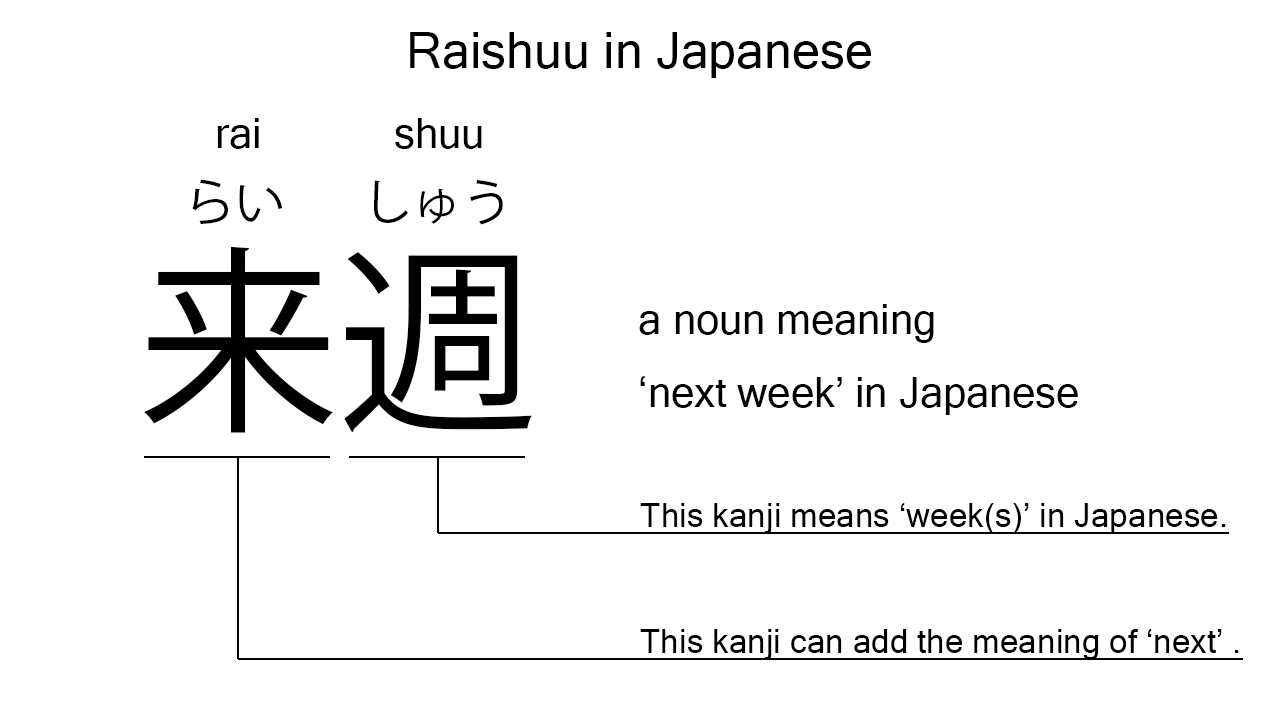What does “raishuu” mean in Japanese?
Native speakers say “raishuu” to mean ‘next week’ in Japanese. Probably, many Japanese learners know this word as it is quite often used in Japanese conversations. In this blog post, however, I will explain it in detail based on its kanji expression. And also, I will explain how to use it through example sentences. My explanations would help Japanese learners understand “raishuu” more clearly. Then, let’s get started!
Contents
Definition and meaning of “raishuu”
Let me start with the definition and meaning of “raishuu”.
- raishuu – 来週 (らいしゅう) : a noun meaning ‘next week’ in Japanese.
Grammatically, this is a noun. In reality, however, this can also work as an adverb almost anywhere in a sentence. In Japanese, many time-related nouns can also work as adverbs. “Raishuu” is one of them. This fact is perhaps weird to Japanese learners, but not unique to the Japanese language. In English, for example, “next week” can also work as both a noun and an adverb. So, Japanese learners, especially those who are familiar with English, can easily understand this point, I think.
The definition and meaning are not that difficult. To understand this noun more clearly, however, let me explain its kanji characters in detail, one by one.
Raishuu in kanji
The kanji expression of “raishuu” consists of the following two kanji characters:
- 来 : a kanji character often used as a prefix to add the meaning of ‘next’, ‘coming’, ‘following’, or such. This kanji can also be found in other words like “rainen“.
- 週 : a kanji character widely used to mean ‘week’ in Japanese.
These two kanji characters tell us that “raishuu” literally means ‘next week’ in Japanese. So, what the kanji characters express is completely in line with the actual meaning.

When we meet new kanji expressions, we should check their kanji characters in detail to understand their meanings clearly and deeply. In many cases, kanji characters tell us a lot about the meanings of the expressions they form. Actually, here, we could get the better understanding of “raishuu” through the detailed kanji check above.
So far, I’ve explained the definition and meaning of “raishuu” together with its kanji characters. Then, let me explain how to use it through the example sentences below.
Example #1: how to say “next week” in Japanese
boku wa raishuu umi ni iki masu – 僕は来週海に行きます (ぼくはらいしゅううみにいきます)
I will go to the sea next week.
Below are the new words used in the example sentence.
- boku – 僕 (ぼく) : a pronoun meaning ‘I’ in Japanese. This is used mainly by boys and young males.
- wa – は : a binding particle working as a case marker or topic marker. In the example, this works after “boku” to make the subject in the sentence.
- umi – 海 (うみ) : a noun meaning ‘sea’ in Japanese.
- ni – に : a case particle used to say where someone or something goes. In the example, this is used after “umi” to say where the speaker will go next week.
- iki – 行き (いき) : one conjugation of the verb, “iku“, which means ‘to go’ in Japanese. In the example, it has been conjugated for the better connection with its following word.
- masu – ます : an auxiliary verb used after a verb to make it polite. Probably, this is well known as a part of Japanese masu form. In the example, this is used after “iki” to make it sound polite.
This is a typical usage of “raishuu”. In this example, it works as an adverb in the middle of the sentence to say “next week” in Japanese.
Example #2: another usage of “raishuu”
gomennasai, raishuu wa isogashii desu – ごめんなさい、来週は忙しいです (ごめんなさい、らいしゅうはいそがしいです)
Sorry, but I will be busy next week.
Below are the new words used in the example sentence.
- gomennasai – ごめんなさい : a Japanese phrase for ‘sorry’ or such.
- isogashii – 忙しい (いそがしい) : an i-adjective meaning ‘busy’ in Japanese.
- desu – です : an auxiliary verb used after a noun or adjective to make it polite. Probably, this is well known as a part of Japanese desu form. In the example, this is used after “isogashii” to make it sound polite.
This is another typical usage of “raishuu”. Although “next week” works as an adverb in the English sentence, “raishuu” works as a noun in the Japanese sentence. Its original meaning is more like ‘sorry, but the next week will be busy.’ When we want to say “next week” in Japanese, anyway, “raishuu” is always a very good option.
Summary
In this blog post, I’ve explained the definition and meaning of “raishuu” in detail based on its kanji expression. And also, I’ve explained how to use it through the example sentences. Let me summarize them as follows.
- raishuu – 来週 (らいしゅう) : a noun meaning ‘next week’ in Japanese. This can also work as an adverb almost anywhere in a sentence. These two kanji characters literally mean ‘next week’ in Japanese. So, what the kanji characters express is completely in line with the actual meaning.
Hope my explanations are understandable and helpful for Japanese learners.